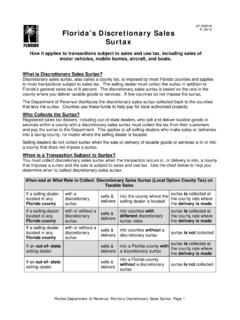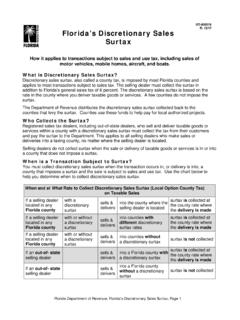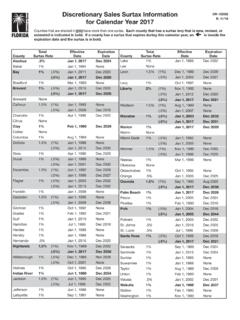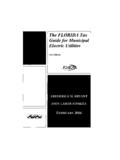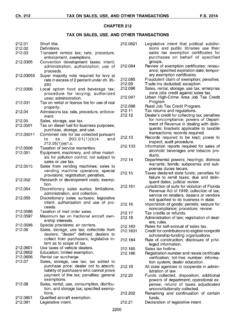Transcription of Sales and Use Tax on GT-800067 N.12/10 Construction ...
1 Sales and Use Tax on Construction , Improvements, installations and repairs GT-800067 In florida , the taxing of property improvements, installation , and repairs varies according to the exact nature of the transaction. This publication can help you determine: If you need to pay Sales and use tax when you buy parts and materials. If you need to charge tax to your customers. It will also explain what documentation you need to buy parts and materials tax-exempt. Definitions Real property The land, its improvements, and fixtures; also called realty and real estate.
2 Improvements to real property include the activities of building, erecting, constructing, altering, improving, repairing, or maintaining real property. Fixture An item that is permanently attached to the realty, building, other structure, or land, that keeps its separate identity after installation . All repairs are treated as repairs to real property. The term fixture does not include titled property, machinery, or equipment. Tangible personal property Personal property that you can see, weigh, measure, touch, or is in any manner perceptible to the senses, but not permanently attached to real property.
3 Fabricated cost The cost to a real property contractor to fabricate an item. This includes direct materials, labor, and other costs that are allocated to production. Fabricated items Items contractors manufacture, produce, process, compound, or fabricate for their own use in performing contracts for improvements to real property. Real Property Generally, transactions that involve items that are permanently installed into a structure, where they cannot be removed without destroying them, are classified as real property and are not subject to Sales tax. You should also consider the pricing arrangement in the contract when determining whether to charge tax.
4 Examples of Real Property Carpeting (permanent) Carpentry Dock, pier, seawall Driveway Electrical system Elevator, escalator Landscaping Masonry work Roofing Tile Types of Contracts Under lump sum, cost plus, fixed fee, guaranteed price, or time-and-materials real property contracts, the contractor is the final consumer of materials and supplies and: Must pay Sales tax to suppliers on all purchases, including those made for the contractor s own use. Should not charge tax to the customer. Contractors who perform taxable fabrication must pay use tax on the fabricated cost of the items fabricated.
5 When calculating use tax on the cost of items of tangible personal property manufactured, produced, compounded, processed, or fabricated, the contractor should: Include the cost of the direct materials used to fabricate an item if the contractor did not pay tax to the materials vendor on the purchase of the materials. Exclude the cost of the direct materials if the contractor paid tax when it purchased the materials. Retail sale plus installation contracts are contracts for improvements to real property where the contractor or subcontractor lists and prices in the contract all materials to be used before the work begins.
6 The contractor or subcontractor also must agree to: Sell specifically described and listed materials and supplies at an agreed price or regular retail price, and Complete the work for either an additional agreed price or based on time used. Since the sale of the materials is a separate transaction from the installation , the customer must assume title and risk the loss of the materials and supplies as delivered, rather than accepting only title to the completed work. A contractor who performs retail sale plus installation contracts: Should buy the materials tax-exempt for resale.
7 Should charge the customer tax on all materials. Use of Materials Tax is due on the use of goods by the contractor. The contractor is responsible for the tax if Sales tax was not paid at the time of purchase. Contractors may manufacture or fabricate a finished product from raw materials for use in a contract. Contractors owe tax on the manufactured cost of such products. For example, a cabinet maker/installer must pay Sales tax on the manufactured cost of the cabinet. If a contractor fabricates a product at the job site, fabrication labor is exempt from tax.
8 Only the cost of the materials is subject to tax. Construction for Tax-Exempt Entities The contractor cannot use an entity s tax-exempt status to purchase materials used under a Construction contract for the entity. Contractors owe tax on these purchases. However, the tax-exempt entity may buy the materials directly from the materials vendor and pay no tax when certain conditions are met: The tax-exempt entity must issue its purchase order and a copy of its exemption certificate, and make payment directly to the materials vendor. The vendor must directly invoice the tax-exempt entity.
9 The tax-exempt entity must take title to the materials upon delivery to the jobsite; it must assume the risk of loss of the materials at the time of purchase. The seller of the materials or supplies must receive a purchase order and a copy of an exemption certificate issued directly from the tax-exempt entity before shipment or delivery. If the vendor does not receive this documentation, the vendor must collect Sales tax from the contractor who placed the order. Effective January 2, 2011, governmental entities (excluding the federal government) must issue a Certificate of Entitlement to each vendor and contractor to purchase supplies and materials tax-exempt for use in public works contracts.
10 The Certificate of Entitlement certifies that: The materials and supplies purchased will become part of a public facility. The governmental entity will be liable for any tax, penalty, or interest due if the Department later determines that the items purchased do not qualify for exemption. The criteria established in Rule , , are being followed. For more information, see Tax Information Publication 10A01-18. The contractor cannot reverse and/or rebill an otherwise taxable purchase after shipment or delivery. Tangible Personal Property Generally, when installing or repairing tangible personal property, parts and labor are taxable.
